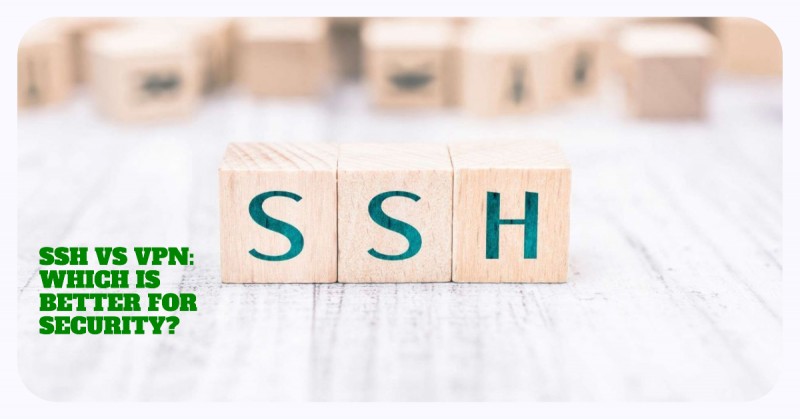
In today's digital age, ensuring the security and privacy of our online activities has become more important than ever. With cyber threats and data breaches on the rise, individuals and businesses are constantly seeking ways to protect their sensitive information. Two popular options for securing internet connections are SSH (Secure Shell) and VPN (Virtual Private Network). Both technologies offer different features and advantages, but which one should you pick? In this article, we will explore the benefits of SSH and VPN, compare their functionalities, and help you make an informed decision based on your specific needs.
1. Introduction
In this digital era, the need for secure and private online connections is paramount. Both SSH and VPN offer solutions to enhance the security of your internet activities. However, it's essential to understand their differences and determine which one suits your requirements better.
2. Understanding SSH
SSH, or Secure Shell, is a cryptographic network protocol that allows secure remote access to a computer or server. It provides an encrypted connection between the client and the server, ensuring that data transmitted over the network remains confidential and protected from eavesdropping or unauthorized access.
3. The Advantages of SSH
Secure Remote Access: SSH enables users to securely connect to remote servers or devices over an unsecured network, such as the internet. It encrypts the communication, preventing malicious actors from intercepting sensitive information.
Strong Authentication: SSH utilizes public-key cryptography for authentication, making it highly secure. It offers an extra layer of protection by requiring the use of key pairs, reducing the risk of unauthorized access.
Data Tunneling: SSH allows for secure data tunneling, also known as SSH tunneling. It enables users to encrypt and forward data between local and remote hosts, enhancing security when accessing resources or transferring files.
4. Introducing VPN
A Virtual Private Network, or VPN, creates a secure connection between the user's device and the internet by routing the traffic through an encrypted tunnel. It masks the user's IP address and encrypts the data, providing privacy and anonymity.
5. The Benefits of VPN
Enhanced Privacy: VPNs encrypt all internet traffic, making it difficult for third parties to intercept or monitor online activities. It ensures that your browsing history, personal information, and online communications remain private.
Bypassing Geographical Restrictions: VPNs allow users to access geo-restricted content by masking their IP address and routing the traffic through servers located in different countries. It enables individuals to bypass censorship and access region-specific websites or streaming platforms.
Public Wi-Fi Security: When connected to public Wi-Fi networks, VPNs provide an additional layer of security by encrypting the data transmitted between the device and the VPN server. It safeguards sensitive information from potential hackers or eavesdroppers.
6. Comparing SSH and VPN
While both SSH and VPN offer secure connections, they serve different purposes and have distinct functionalities.
SSH is primarily used for secure remote access and secure data tunneling. It is commonly employed by system administrators or developers who need to manage remote servers securely.
VPNs, on the other hand, are designed to create a secure connection between the user's device and the internet. They are widely used by individuals seeking privacy, security, and the ability to bypass geographical restrictions.
7. Choosing Between SSH and VPN
The decision to choose between SSH and VPN depends on your specific requirements and use cases. Consider the following factors when making your decision:
Use Case: If you need to securely access and manage remote servers or devices, SSH is an excellent choice. On the other hand, if your primary concern is online privacy, bypassing restrictions, or securing your internet connection on public networks, a VPN is more suitable.
Technical Expertise: SSH requires some technical knowledge to set up and configure, making it more suitable for users with a background in system administration or development. VPNs, on the other hand, are generally user-friendly and can be easily set up on various devices.
Network Scope: If your security needs are limited to specific devices or connections, SSH might be sufficient. However, if you require comprehensive protection for all your internet traffic across multiple devices, a VPN offers a more comprehensive solution.
8. Factors to Consider
When deciding between SSH and VPN, consider the following factors:
Security: Both SSH and VPN provide encryption and secure connections, but the level of security may vary. Evaluate the encryption protocols and algorithms used by each technology to ensure they meet your security requirements.
Speed: VPNs may introduce some latency due to the additional overhead of encryption and routing. SSH, being primarily designed for remote access, generally offers faster connection speeds.
Compatibility: Check the compatibility of SSH and VPN with your devices and operating systems. Ensure that the technology you choose is supported across all the devices you intend to use.
9. Conclusion
In conclusion, choosing between SSH and VPN depends on your specific needs and use cases. SSH is ideal for secure remote access and data tunneling, while VPNs offer enhanced privacy, bypassing restrictions, and securing internet connections. Consider your requirements, technical expertise, and network scope to make an informed decision.
In conclusion, both SSH and VPN offer valuable security features and have distinct use cases. Understanding your specific requirements and considering factors such as security, speed, and compatibility will help you determine whether SSH or VPN is the right choice for you. By prioritizing your privacy and security needs, you can make an informed decision to protect your online activities effectively.
Ryzen vs. Intel: Unveiling the Ultimate Processor Battle
Know more about augmented reality (AR)
The Best Damn Halloumi Fries You'll Ever Eat: How To Prepare Them